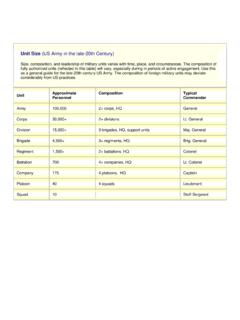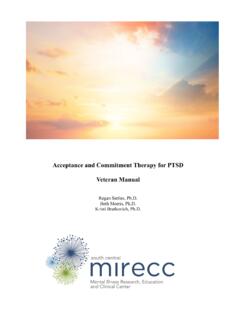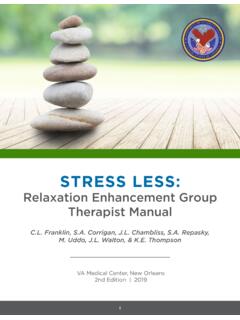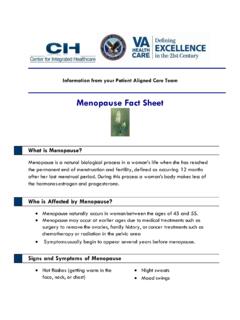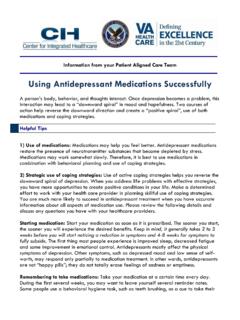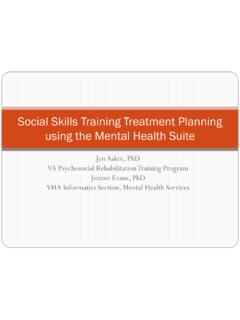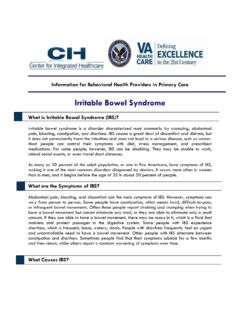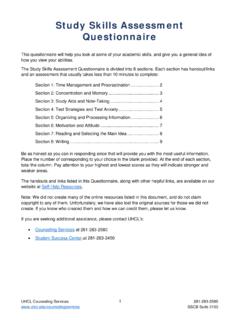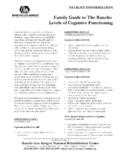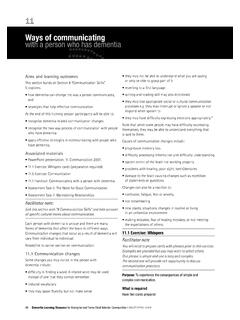Transcription of Facts about Antipsychotic Medications - Veterans Affairs
1 Facts about Antipsychotic Medications Introduction Antipsychotic Medications (also referred to as neuroleptics) are a class of drugs commonly used to treat serious psychiatric disorders. These drugs were discovered in the 1950s and have since been used extensively with a variety of psychiatric populations. Antipsychotic Medications are especially useful in the treatment of schizophrenia, schizoaffective disorder, and mania with psychosis. Antipsychotic Medications are not a "cure" for psychiatric disorders. However, most individuals who are prescribed these Medications experience some relief from their symptoms and they can often live satisfying, productive lives. How Does Antipsychotic medication Work? Scientists do not have a full understanding of why Antipsychotic Medications are effective. However, all of these Medications reduce the action of a particular neurotransmitter (a chemical in the brain for communication between nerve cells) called dopamine.
2 Unique Antipsychotic Medications (Clozaril, Risperdal, Zyprexa, Seroquel, Geodon) have effects both on dopamine as well as another neurotransmitter, serotonin. It is possible that both dopamine and serotonin are involved in the production of psychotic symptoms. The Clinical Effects of Antipsychotic Medications Antipsychotic Medications are used primarily for reducing psychotic (positive) symptoms of schizophrenia and schizoaffective disorder, such as hallucinations, delusions, and bizarre behavior. These Medications sometimes also improve negative symptoms of these disorders, such as social withdrawal and poor attention. Antipsychotic Medications are used most often for the treatment of schizophrenia and schizoaffective disorder, although individuals with other disorders, such as bipolar disorder and major depression, may also benefit from them. When Antipsychotic Medications are used in the treatment of bipolar disorder or major depression, it is usually in combination with other Medications (such as mood stabilizers or antidepressants).
3 Major Uses for Antipsychotic Medications There are two major uses for Antipsychotic Medications : 1. Reducing acute (severe) symptoms to a level where the symptoms are more manageable; and 2. Preventing symptom relapses and rehospitalizations. Reducing Acute Symptoms When a person has severe psychotic symptoms, such as during a relapse, Antipsychotic Medications are usually prescribed. If the person has already been receiving these drugs, the dosage may be increased. Sometimes the clinical effects of Antipsychotic Medications are quite rapid, with improvements apparent in as little as one or two days. Usually, however, several weeks of Antipsychotic treatment are needed to reduce symptoms significantly. Preventing Symptom Relapses Even after symptoms have been controlled by Antipsychotic Medications , the medication can prevent future relapses. For example, about seven in every ten people (70 percent) with schizophrenia or schizoaffective disorder who are not on Antipsychotic Medications relapse over a one-year period, but only three in ten people (30 percent) who are taking the medication relapse.
4 Thus, Antipsychotic Medications can help many individuals stay out of the hospital and improve their overall functioning. How are Medications Taken? Some Medications , such as aspirin, work very quickly to achieve their clinical effects. Other Medications , such as Antipsychotic Medications , must build up in the bloodstream over time to achieve their clinical effects. Thus, they must be taken regularly as prescribed to control and reduce symptoms over the long term. Antipsychotic Medications are usually taken orally daily or with long-acting injections (taken every two to four weeks). In emergency situations, Antipsychotic Medications can also be given in higher doses by injections, although the advantage of this mode of administration is not clearly established. Types of Antipsychotic medication There are many different types of Antipsychotic medication . Most Antipsychotic drugs have the same beneficial effects on symptoms and reducing relapse, although there is evidence that Clozaril (clozapine) has unique effects on treatment-refractory symptoms (see section below on Clozaril).
5 While most Antipsychotic Medications have similar clinical effects, some Medications are more potent than others. Thus, larger amounts of low potency drugs are given than high potency drugs. The chart below contains the brand names, generic names, and daily oral dosage range for some of the most commonly prescribed Antipsychotic Medications . Brand Name Generic Name Average Daily Dosage (mg/Day) Abilify* aripiprazole 10-30 Clozaril clozapine 100-900 Fanupt iloperidone 1-24 Geodon ziprasidone 40-160 Haldol* haloperidol .5-40 Invega* paliperidone Latuda lurasidone 40-80 Loxitane loxapine 5-250 Mellaril thioridazine 25-800 Moban molindone 15-225 Navane thiothixene 6-60 Prolixin* fluphenazine 1-40 Risperdal risperidone 3-6 Saphris asenapine 5-10 sublingual Serentil mesoridazine 25-400 Seroquel quetiapine 300-400 Stelazine trifluoperazine 2-40 Thorazine chlorpromazine 50-1250 Trilafon perphenazine 8-64 Zyprexa** olanzapine 5-20 *Also available in long-acting injections.
6 **Also available in short-acting injections. Side Effects Antipsychotic Medications , like most other drugs for treating other illnesses, can cause undesired side effects. Some side effects include: drowsiness, muscle stiffness, dizziness, dry mouth, mild tremors, restlessness, increased appetite, blurred vision, and sexual difficulties. Some of these Medications also cause weight gain and increased risk of diabetes or high cholesterol. It is very important that individuals on these Medications work closely with their doctors to monitor for the development of these problems. Careful attention to diet and exercise, as well as not smoking, can be important in combatting these side-effects. Not all persons taking medication experience side effects. In many cases side effects are temporary, especially if they are treated with side-effect Medications . Sometimes the medication dosage needs to be reduced because of side effects or a different type of medication must be given.
7 When side effects are detected, the physician should be consulted as soon as possible. Medications for Side Effects A variety of Medications are commonly used to treat the Extrapyramidal side effects of Antipsychotic Medications (such as muscle stiffness, mild tremors, and increased salivation). The specific Medications and daily dose ranges are provided in the chart below. Medications for Extrapyramidal Side Effects of Antipsychotic Medications Brand Name Generic Name Average Daily Dosage (mg/Day) Artane trihexyphenidyl 5-15 Benadryl diphenhydramine 50-300 Cogentin benztropine Kemadrin procyclidine 5-20 Symmetrel amantadine 40-100 One side effect of Antipsychotic Medications that can be especially disturbing is akathisia. Akathisia is characterized by restlessness and difficulty sitting still, and an uncomfortable feeling of agitation. Side effect Medications used to treat other side effects of Antipsychotic Medications are sometimes less effective for akathisia.
8 One strategy for treating it is to lower the dose of Antipsychotic medication . Another strategy is to prescribe other Medications , including beta blockers or benzodiazepines. Some of the Medications used to treat akathisia are outlined below. Some Medications Used to Treat Akathisia Type of Drug Brand Name Generic Name Beta Blockers Corgard nadolol Inderal propranolol Tenormin atenolol Benzodiazepines Ativan lorazepam Valium diazepam Side effect Medications can sometimes also cause mild side effects themselves. Typical side effects might include: Dry mouth, constipation, blurry vision, drowsiness, urinary retention, memory loss Increase in psychotic symptoms Fatigue, depression Drowsiness, psychological or physiological dependence, psychomotor impairment, memory loss Tardive Dyskinesia One side effect of special concern is tardive dyskinesia (TD). This is a neurological syndrome in which the person has involuntary muscle movements, usually in the tongue, mouth, lips, the trunk, or in the extremities, such as hands, fingers, or toes.
9 In most cases, the movements associated with TD are mild. In cases of more severe TD, some individuals are more bothered by it than others. The risk of developing TD is low during the first year of treatment with Antipsychotic Medications , but increases after this period. Most studies suggest that between one and two of every ten individuals on Antipsychotic Medications (10-20 percent) develop TD. The chances of developing TD increase with the amount of time the person is on Antipsychotic Medications and the dosage level. Clozaril does not appear to cause TD and may even improve the condition in some individuals. Other than treating with the lowest effective dose or considering a switch to Clozaril, there are no established treatments for TD. If any signs of TD are noted, it is very important to let the doctor know immediately. Clozaril Clozaril (clozapine) is a unique Antipsychotic drug that has been available in the United States for about 15 years (it has been used in Europe for more than 25 years).
10 Some research has found that Clozaril is an especially effective medication for treatment-refractory symptoms such has hearing voices or severe social withdrawal. Although Clozaril is most often prescribed for persons with schizophrenia or schizoaffective disorder, it can also be given for other psychiatric disorders. Some of the side effects of Clozaril are different from other Antipsychotic Medications . Side effects of Clozaril include: drowsiness, increased salivation, dizziness, stiffness, and a slight increase in body temperature (temperatures below 101 F), changes in blood pressure, constipation, weight gain, headache, tachycardia (rapid heart rate), cataplexy (sudden loss of muscle tone), and seizures. One important side effect of Clozaril that occurs in a small percentage of people is a reduction in number of white blood cells (a condition called agranulocytosis). If this side effect begins to develop, the person must be taken off of Clozaril (and switched to another Antipsychotic ), because the white blood cells are necessary to fight diseases.
